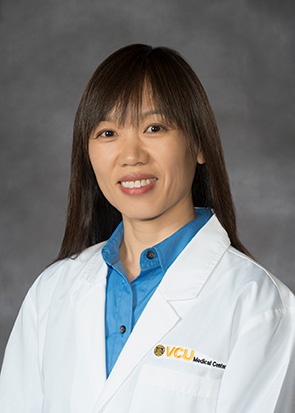
Xinli Du, MD PhD
SpecialtiesNeuromuscular clinic
Locations
Areas of interest
EMG
Chemodenervation
Bio
A neurologist on a mission ‘to make the world a better place’
Even with her background and education in neuroscience, “I am constantly amazed by the complexity of our nervous system, and the critical-thinking skills and challenges around diagnosing and managing neurological conditions,” says Dr. Xinli Du, a physician board-certified in neurology and neuromuscular medicine at VCU Health.
It is that commitment to finding cures and providing care that drives Dr. Du in her practice, where she treats adult patients living with common neurologic issues such as migraine headaches or more complex conditions like myopathy, neuropathy, neuromuscular junction disorders, or degenerative conditions such ALS. She performs routine and specialized electromyography to study muscle response and electrical activity in the nerves, as well as biopsies to diagnose nerve and muscle diseases. She is also a specialist in chemodenervation (Botox injection) to treat neurological conditions such as dystonia, spasticity, blepharospasm, chronic migraine, and others.
“Very often, from that first meeting with the patient, I can provide a list of possibilities and make a plan for confirming the diagnosis,” she says. “I welcome questions from the patient, and have found that the more the patient gets involved, the more trust and collaboration I can build. That trust translates into even better patient care.”
She also teaches the next generation of neurologists, serving as assistant clinical professor and site director of resident education at the Hunter Holmes McGuire VA Medical Center. She moves between treating patients at VCU’s NOW Center in Short Pump to caring for veterans with neurological conditions at the VA, located just a few miles south of the city.
Dr. Du chose to pursue a career in medicine – neurology, specifically – as a way “to care and help patients, educate and empower them to take control of their health,” she says. “Every day at VCU Health, we are finding new answers, helping people, gaining new knowledge and skills, and making incredible breakthroughs in our knowledge of the brain and nervous system.”
Despite advances in care, she says, there is still a long way to go to understand how the brain works. “yet what we have experienced, just in the past few years, has been a transformational shift in the number of therapies available for neurological diseases and conditions that were once thought incurable,” she explains.
Still, she says, there are many neurological and neuromuscular conditions that do not have a cure or effective treatment.
“That reality can be hard to accept as a physician,” she says. “It’s even harder to convey to patients and their family. And for those patients and families, we do everything we can to take good care of them and provide the right treatments and therapies they need to live as comfortably as possible.”
Her advice to patients undergoing neurological care or facing a diagnosis? “Stay positive, find a support system, get involved, ask questions, and stay connected with your care team,” she says. “And most of all: Be your own best advocate.”
